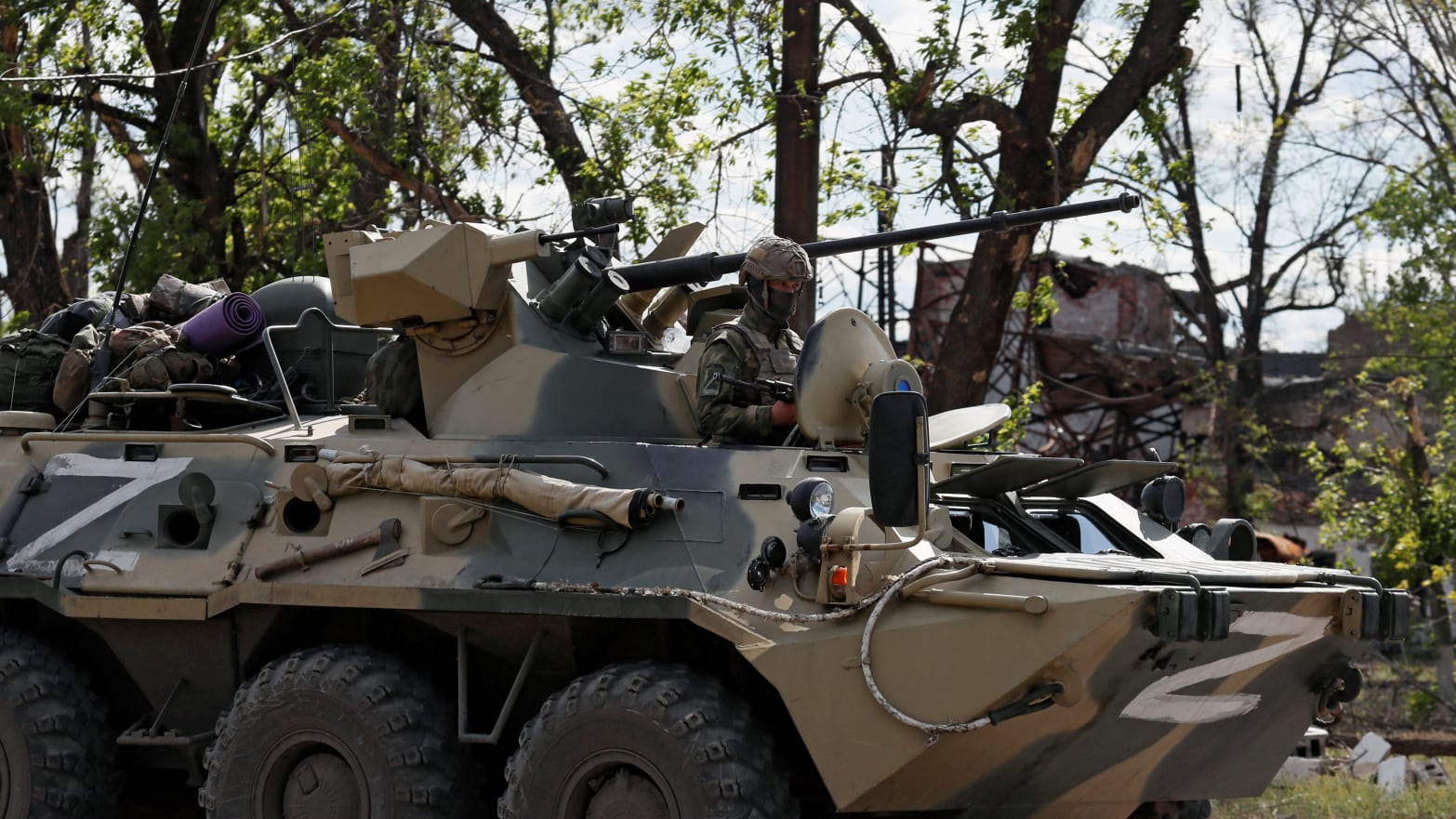Foreign volunteers fighting against Russian troops in Ukraine sounded the alarm Wednesday over two American fighters they say had been taken captive amid heavy fighting.
Alexander Drueke, 39, and Andy Huynh, 27, were serving with the Ukrainian military when they were taken in Kharkiv last week, The Telegraph reported.
“We were out on a mission and the whole thing went absolutely crazy, with bad intel. We were told the town was clear when it turned out the Russians were already assaulting it,” a man who had been fighting alongside the two told the newspaper. He said the two had vanished in a showdown with Russian forces, and a subsequent search of the area “found no sign of them, nothing.”
The two are believed to be the first American volunteers taken prisoner by Russian forces since the Feb. 24 invasion.
Earlier Wednesday, a Twitter account run by a task force comprising former U.S. and French servicemen announced that two Americans had been taken captive.
There was no immediate confirmation from Ukrainian authorities, though the statement noted that the men’s fate had been “confirmed by Ukrainian intelligence.”
“We have not since heard anything about their well-being,” the statement said, explaining that the Americans had been taken when “a week ago our team ended up isolated in the middle of a Russian Offensive.”
The Ukrainian Defense Ministry and the ministry’s Main Intelligence Directorate did not immediately respond to a request for comment.
But the news came as Russian officials doubled down on their calls for the death penalty to be used against foreign volunteers in Ukraine.
During the St. Petersburg International Economic Forum on Wednesday, Maria Zakharova, a spokesperson for Russia’s Foreign Ministry, praised the recent death sentence handed down against two British citizens and a Moroccan citizen by Russian proxies in occupied Donetsk.
British citizens Shaun Pinner and Aiden Aslin, along with Moroccan citizen Ibrahim Saadun, were all officially part of the Ukrainian Armed Forces when they were captured amid heavy fighting in Mariupol. Russian-backed authorities rushed through a trial against the group in less than three days and handed down a death sentence last Thursday.
“Such a harsh sentence, it seems, will become a clear example for all the other so-called soldiers of fortune who fight on the side of Ukrainian neo-Nazis or intend to join them, because this is a crime against the civilian population of Donbas,” she said, echoing the Kremlin’s twisted narrative that neo-Nazis control Ukraine despite the president himself being Jewish.
The chairman of Russia’s State Duma also offered a menacing take Wednesday on the fate of those held captive by Russian proxies in Ukraine.
Vyacheslav Volodin urged Russian-backed proxies in the occupied area of Donetsk to use the death penalty against those taken captive in the war.
“The death penalty is a measure of punishment these fascists deserve,” he wrote on Telegram, accusing those fighting for Ukraine of “crimes against humanity.”
While Russia currently has a moratorium on the death penalty, he said “there is a norm in the [Donetsk People’s Republic] that it would be correct to preserve. It is especially relevant in war time.”
Russia’s Defense Ministry has repeatedly claimed that foreign volunteers fighting for Ukraine are “mercenaries” who are not protected by international humanitarian laws, despite the men officially joining the Ukrainian military.
Kremlin spokesman Dmitry Peskov told reporters earlier this week that British authorities hoping to appeal the death sentence against Pinner and Aslin must turn not to Moscow for help, but to “authorities of the country whose court issued the sentence,” i.e., Russian proxies in the unrecognized Donetsk People’s Republic.
While the fate of the foreign captives hangs in the balance, the friends and loved ones of Ukrainian troops who were captured defending Mariupol’s Azovstal steel plant have begged the world not to forget them either. Hundreds of Ukrainian defenders remain in captivity in territory occupied by Russian proxies, their conditions unknown.
A video appeal released Wednesday by the Association of Azovstal Defenders’ Families called on international journalists and the International Red Cross to visit the penal colony in the occupied town of Olenivka where many of the men are being held. Ukrainian authorities have said more than 2,500 Ukrainian defenders were taken into Russian captivity at Azovstal, with some brought across the border and some tossed into penal colonies run by Russian proxies.
“We must not forget the Azovstal heroes,” the group said, adding that the “world must know the truth.”
Several family members of those in Russian captivity said they have not received any information on the men or heard from them in weeks.
“In accordance with the Geneva convention, they have the right to call their relatives twice a week to confirm that they are OK. Not once did we get a call,” said Tatyana Kharko, the sister of one of the Ukrainian defenders.
“The soldiers fulfilled their duty, they did everything to protect our country. … And now it’s the duty of the state to do everything to protect them there. We understand what kind of methods Russia can use. We know about all these methods. And we don’t want [those methods used], because our soldiers don’t deserve that,” said Yekaterina Prokopenko, the wife of an Azov commander in Russian captivity.

